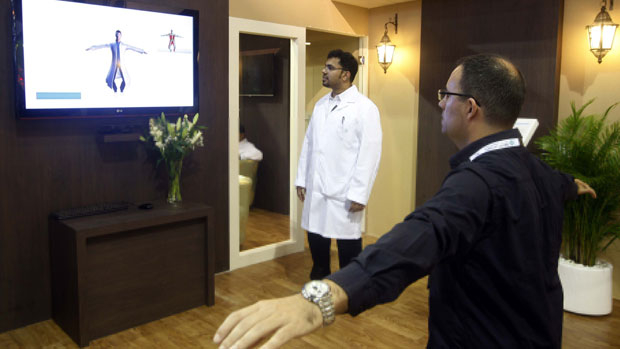
Dubai: Patients will be able to perform physiotherapy exercises in the comfort and privacy of their own home – guided by a virtual therapist on screen.
The Personal Therapist (PeThe), which will be made available at Dubai government health facilities, will do away with the need to visit a physical rehabilitation centre for daily exercise.
The Dubai Health Authority (DHA) is demonstrating PeThe at the Gitex Technology Week till Thursday. It has been tried at Rashid Hospital since April.
The system comprises a screen connected to a computer software and motion sensors. The screen displays a therapist avatar that demonstrates the exercise and asks the patient to follow the movements.
The motion sensors “read” the movements and confirm if they are followed properly. The patient can also see his or her avatar on screen — as a shadow outline — to see how well he or she is performing. The “therapist” also provides voice and visual feedback on ways the patients can improve the movements.
Clinicians can also connect with patients and provide them with real-time feedback as they perform exercises at their own pace.
Using this technology, physiotherapists can devise a home-based plan for patients. The in-built parameters enable the physiotherapist to monitor the improvement of the patient and adapt the physiotherapy programme accordingly.
The PeThe system also allows the caregiver and the patient to communicate through video messages. In the future, live video with the physiatrist and physiotherapist will also be possible.
This system benefits stable patients, travelling patients, and chronic care patients to perform their physical rehabilitation programmes from the venue they choose.
Dubai Health Authority Director-General Eisa Al Maidour said providing patients “with convenient options to ensure they regularly take part in physiotherapy sessions is essential for their optimal recovery. This technology helps provides an additional therapeutic tool to physiotherapists and enhances patient comfort”.
Jerislav Bobic, a Croatia-based PeThe official, told Gulf News the system is easy to set up at home and would probably be provided against a deposit at the health facility, adding Dubai will become the first city to adopt it beyond the trial stage at public health facilities. He added that PeThe is fully customisable, making it suitable for each patient.
PeThe is made possible by the use of Kinect for Windows, which allows users to interact “naturally with computers by simply gesturing and speaking”. The Kinect sensor is a hardware device from Microsoft that recognises people’s natural movements, gestures, and voice commands.
Commenting on the project, Dr Samir Saeed, Managing Director, Regional Director, Health Industry, Microsoft Middle East and Africa, said the development represents “an example of how innovation can have a real impact for better health”.
Amani Al Jasmi, Director of Information Technology at the DHA, added that the system “does not record any videos of the patient, but only captures the movements’ patterns and sends them as an encrypted algorithm, therefore preserving the patient’s privacy at all time”.
Smart pharmacy
The DHA also announced on Tuesday it will start implementing a smart pharmacy system across DHA health facilities.
Al Maidour said the system uses a robot to arrange medicines and dispense them. Pharmacists simply need to store medicines in the robot’s vault before the machine sorts out the medicines according to the near date of expiry and arranges them in specific shelves based on the barcode of the medicines.
“The machines dispense the medicines and the pharmacist simply needs to give them to the patient. The system cuts the patient waiting time by 90 per cent and is highly beneficial to both health-care facilities and patients.”
The system can handle between 15,000 and 100,000 medicines depending on the size of the system. Regularly used medicines are put into the high speed channel and in this channel up to 100 medicines can be dispensed within 30 seconds. Medicines that are not commonly used are stored in shelves and 15 products can be dispensed in less than 10 seconds.
Dr Manal Taryam, CEO of Primary Health Care at the DHA, said, “If there is any expired product in the system, it flags it and it is discarded by the system.”










